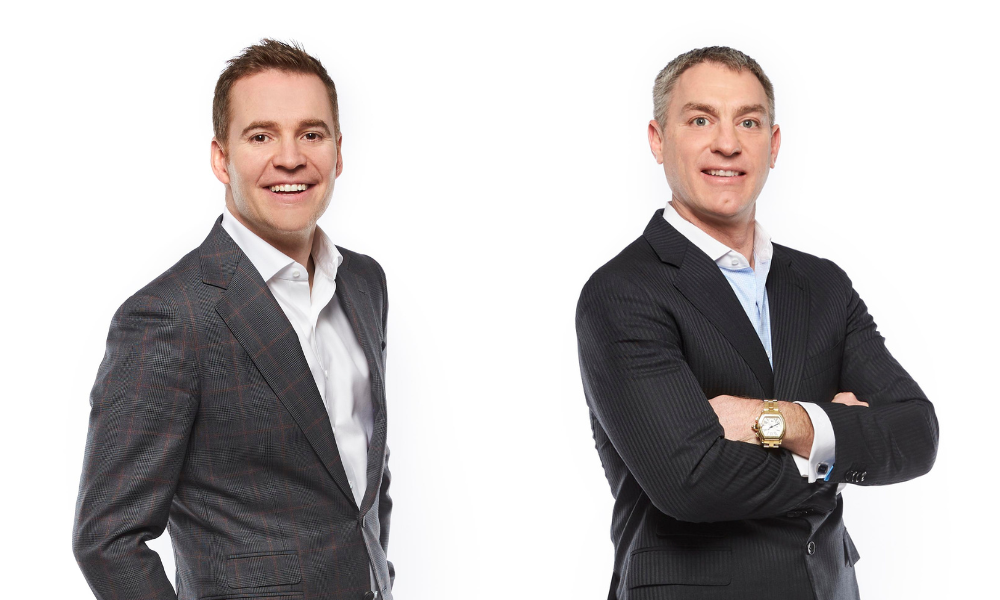Investment advisory team and authors of financial planning handbook walk through some pitfalls and misconceptions

For many business owners and incorporated professionals, the choice between taking compensation from their corporations through dividends or a salary is a tax-planning dilemma. And for two top financial advisors, it’s a question that gets revisited every year.
“Most of our clients are incorporated, whether they're a doctor, a dentist, a business owner, or even an IT consultant,” says Andrew Feindel (pictured above, left), portfolio manager and investment advisor at Richie Feindel Wealth Management with Richardson Wealth. “I revisit [the salary vs. dividends decision] every year, sometimes even more frequently, and the truth is it's dynamic.”
Roughly speaking, Feindel says the incorporated clients he and his partner Kyle Richie (above, right) work with can be segmented into three categories: those who take 100% dividends; those who take a salary of roughly $66,600, which lets them maximize their CPP contributions; and those with salaries of about $175,000, which maximizes their RRSP contributions based on 2023 limits.
“The argument becomes which one is better for each situation,” Feindel says. “I can make a case for how all three are advantageous in certain scenarios.”
There’s no question that Feindel and Richie are experts in that planning area. The two have co-authored a book titled “Kickstart Your Corporation: The Incorporated Professional's Financial Planning Coach”. Published in 2020, it walks through the many nuances of being incorporated, including the benefits of salaries versus dividends and the broader planning implications for each.
One common mistake Richie and Feindel see at their practice happens when clients are advised to take the maximum in salary from their corporation in order to maximize their RRSP. Too often, a client takes the salary, but doesn’t contribute to the RRSP.
“I tell clients ‘If you’re going to have that salary, max out your RRSP,’” Richie says. “Otherwise, there’s going to be a chunk of money you should have had as dividends.”
Another common pitfall people fall into is in using tax integration to compare salaries and dividends. Under that theory, someone looking to get $150,000 from their corporation should be tax-indifferent between getting paid through a salary and getting paid in dividends.
“With ‘perfect’ integration, total tax (corporate and personal) on income earned through a corporation should theoretically equal total tax on income earned directly by an individual,” Richie and Feindel say in their book.
Like most academic math problems, the scenario doesn’t bear out in the real world. According to Richie, dividends are subject to lower personal income tax rates. That means in order to meet a certain cash-flow need, someone wouldn’t need to take out as much in dividends from their corporation compared to if they had gotten paid through a salary.
“The driver should be how much you spend. Based on that, you actually don't need the full $150,000 in dividends,” Richie says. “So the question is ‘how do you come up with a net after-tax cash flow?’ And you can work out how much the client actually needs from there.”
The lower income tax rate on dividends also has implications on whether to hold money in a corporation or an RRSP. While a million dollars held in a corporation might look the same as a million held in an RRSP through a net-worth lens, Richie says there’s more to it.
“The tax rates on dividends are lower than the tax rates on salary and RRSP income,” he says. “Whether you take money out in one year, 10 years, or 50 years, you’re always going to be in a lower tax bracket with money in the corporation than with the RRSP.”
Aside from considering someone’s business structure and insurance plan in deciding the salary-dividend mix, Feindel and Richie also preach the importance of taking their risk tolerance in their investments into account.
“It also depends on your investment style and the products you’re using,” Feindel says. “In Canada, interest income is taxed at the highest rate. So if you’re a conservative investor generating interest income from bonds, GICs, high-interest savings products, or foreign dividends, you’re better off having those in the RRSP where it’s tax-deferred, and taking a salary from your corporation.”
Conversely, someone who prefers a 100% growth portfolio that generates capital gains, or is generating income through eligible dividends, is better off having that money in a corporation and taking compensation through dividends.
“One major overlooked benefit from a corporation is the refundable dividend tax on hand (RDTOH) account,” Feindel says.
Essentially, passive investment income is accumulated in the corporation within the RDTOH account until a taxable dividend is paid out to shareholders. The dividend is taxed in the shareholder’s hands, but the corporation also gets to recover a portion of the previous income taxes paid from the RDTOH account.
“If you just had $150,000 in salary, no dividends, and a bunch of taxable gains in your corporation … you’ll be paying a higher tax rate on your corporate investments,” Feindel says. “If you had dividends, you’d usually be able to recoup some of that.”



